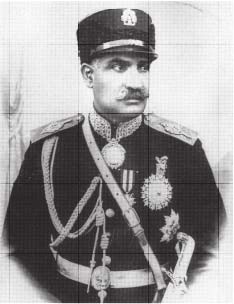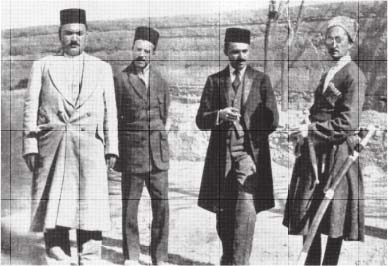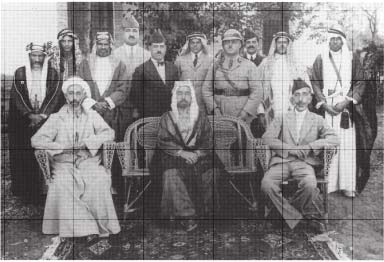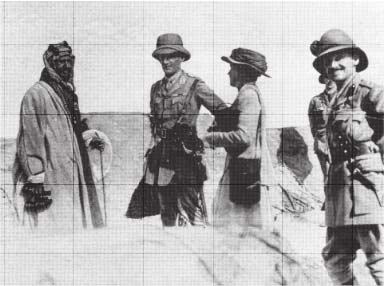A Peace to End all Peace (67 page)
Read A Peace to End all Peace Online
Authors: David Fromkin

44 Mustapha Kemal of Turkey

45 Reza Khan of Persia (Iran)

46 Amanullah Khan of Afghanistan (left), shown with members of his suite

47 King Fuad of Egypt (left) in his palace garden, Cairo

48 Zaghlul Pasha addressing his supporters: the rivalry between the palace and Zaghlul’s Wafd Party was to be a principal feature of Egyptian politics after the First World War

49 Sons of King Hussein of the Hejaz (seated, left to right): Feisal, King of Iraq; Abdullah, Emir of Transjordan and later King of Jordan; and Ali, briefly King of the Hejaz before its capture by Ibn Saud

50 Ibn Saud with Sir Percy Cox and Gertrude Bell. A powerful enemy of King Hussein and his family, Ibn Saud nonetheless remained on friendly terms with the British who protected Transjordan and Iraq against attacks by his followers
CHURCHILL AND THE QUESTION OF PALESTINE
I
As Colonial Secretary in 1921–2, Churchill encountered even greater difficulty in dealing with the vexing problems of Palestine west of the Jordan river than with those of Transjordan and Iraq. The issue in Palestine was Zionism, and so intense were the passions it aroused that it was not always easy to remember what was really at issue. The Zionists pictured Palestine—correctly, as we now know—as a country that could support at least five or ten times more people than lived there at the time; so that without displacing any of the perhaps 600,000 Arab inhabitants, there was room to bring in millions of Jewish settlers.
At the time nothing like that many Jews were prepared to settle as pioneers in Palestine, but Zionists hoped and Arabs feared that they would do so, and the unrestricted right of Jews to enter the country became the central issue in Palestinian politics. Friends of Zionism claimed—and later demonstrated—that Jewish enterprise could enrich the country, but impoverished Arab peasant farmers were persuaded that they were being asked to share what little they possessed with foreigners.
As seen earlier, there had been Arab anti-Zionist riots in Palestine a year before Churchill became Colonial Secretary in February 1921. Not long after he attempted to solve the problems of the Middle East at the Cairo Conference that March, Palestine erupted again. In Jaffa, on May Day 1921, rioting broke out, beginning with looting, but going on to murder: during the first day the Arab mobs killed thirty-five Jews. In the course of a blood-soaked week, fighting spread to the entire country as Arabs besieged Jewish farm colonies outside the principal towns. The original Arab riots in Jaffa were an explosion of anger against a small group of Jewish communists who marched through the center of town to rival an earlier demonstration by a larger group of Jewish socialists. Thus the impression gained ground amongst the British that the disorders were Bolshevik in origin. Captain C. D. Brunton, who had served in the military administration for some time, claimed that the riots had been caused by “Bolshevist Jews” and argued that “the outbreaks of today may become a revolution tomorrow.”
1
The High Commissioner, Sir Herbert Samuel, responded to the Arab attacks by temporarily suspending Jewish immigration into Palestine. Zionist leaders feared that by rewarding Arab violence, Samuel had guaranteed that it would be renewed and that the history of the British Mandate for Palestine would be a stormy one.
Samuel’s administration was slow to restore order; on 10 August 1921
The Times
reported that “Public security, particularly in the north, is for all practical purposes, non-existent. Raids take place almost daily from Transjordania…”
The Times
correspondent claimed that “neither Jews nor Arabs have any confidence in the authorities.” He added that “The older inhabitants say that public security was far better maintained under the Turks.”
Although Arab riots seemed likely to recur, Zionist leaders continued to seek accommodation with the Arabs and to express confidence that most Arabs were in favor of peace and cooperation.
*
II
As Churchill recognized, one of his greatest problems in quelling the Arab riots while going ahead with a pro-Zionist program was that the British forces upon whom he relied were unwilling to enforce his policy.
The anti-Zionist case was easy for the British in Palestine to understand: Arabs had lived in the country for ages and did not want their life and landscape changed. British soldiers and officials worked every day among Arabs who told them so. Of course Jews lived in Palestine too, and their connection with the land was even more long-standing; but much of the case for Zionism, strong though it was, was not entirely tangible: it was partly historical, partly theoretical, and partly visionary (in the sense that it was only in the future that Jewish enterprise would bring a much higher standard of living to all the peoples of the country). The Zionist case was also based on the suffering of Jews in such places as Russia and Poland; but members of the British Palestine administration had never witnessed that suffering and were not necessarily aware of it.
According to Vladimir Jabotinsky, the militant Zionist who had founded the Jewish Legion in Allenby’s army, the British military found Zionism to be a “fancy” theory, far-reaching and aiming to repair the world’s ills, and therefore unsound. According to Jabotinsky, such fancy schemes for improving the world ran counter to all the instincts of the average Englishman of the ruling classes.
3
Jabotinsky pointed out, too, that the administration was staffed by professional Arabists. These were people (he wrote) so attracted to the Arab world (as they conceived it to be) that they underwent the discipline of learning the Arab language and qualifying themselves for the Civil Service, and were willing to leave Britain to spend their professional lives in the Arab Middle East; and it was natural that they would not want to see the Arab character of Palestine changed.
Jabotinsky touched on, but did not stress, what may have been the principal reason for British opposition to the Balfour Declaration policy: it caused trouble. It was unpopular with the Arabs who constituted the bulk of the population, while the job of the British colonial administration was to keep the population quiet and satisfied. British civil and military personnel in Palestine had reason to believe that they could have enjoyed an easy and peaceful tour of duty in a contented country, if it were not for London’s policy, adopted for reasons not readily grasped, that excited communal tension and violence and exposed the local British administration to difficulty and even danger.
However disaffection in the British ranks led ironically to an increase in the difficulty and danger, by encouraging Arab resistance and intransigence at a time when London was not yet prepared to yield. A particular episode that was to have lasting consequences was the intervention of the Palestine administration in the selection of a new religious leader for the Moslem community.
The episode began with the death, on 21 March 1921, of the Mufti of Jerusalem. A mufti was an official who expounded the Moslem religious laws, and the Mufti of Jerusalem was the chief such jurist in his province. The British administration—bestowing a title apparently of its own invention—also designated him as the Grand Mufti and as the leader of the Moslem community in Palestine.
4
According to the Ottoman law, which the British incorporated into their own, the government was to select the new Grand Mufti from among three candidates nominated by a Moslem electoral college.
Although he was not among the three candidates nominated, Amin al-Husseini, a political agitator in his mid-twenties who had been sentenced to ten years’ imprisonment (though later pardoned) for his leadership role in the 1920 riots, was named as the new Grand Mufti as a result of an intrigue by a violently anti-Zionist official named Ernest T. Richmond, a member of the British High Commissioner’s secretariat.
Richmond was an architect who had served before the war in the Egyptian Public Works Administration and owed his job in Palestine to Ronald Storrs, a close friend with whom he shared a house for a time in Jerusalem. In the Palestine administration he served as a liaison with the Moslem community, acting (according to General Gilbert Clayton) “as to some extent the counterpart of the Zionist Organisation.”
5
According to an official of the Colonial Office in London, Richmond was “a declared enemy of the Zionist policy” of the British government.
6
He crusaded against that policy, and several years later—in 1924—wrote to the British High Commissioner in Palestine that in pursuing Zionism, the High Commissioner and his officials, the Middle East Department of the Colonial Office in London, and the Zionist Commission in Palestine “are dominated and inspired by a spirit which I can only regard as evil.”
7
When he secured the position of Grand Mufti and leader of the Palestinian Moslems for Amin al-Husseini in 1921, Richmond must have believed that he was striking a blow against Zionism. As time would show, he had struck a crueler, more destructive blow against Palestinian Arabs, whom the Grand Mufti was to lead into a bloody blind alley. An all-or-nothing adventurer, the Grand Mufti placed Arab lands and lives at risk by raising the stakes of the Arab-Jewish conflict such that one or another—Jews or Arabs—would be driven out or destroyed. Eventually the Grand Mufti’s road was to lead him to Nazi Germany and alliance with Adolph Hitler. While Amin al-Husseini did not control Arab Palestine—he had many rivals for leadership—his position as Grand Mufti gave him an advantage in the contest for the allegiance of the deeply divided Arab communities in Palestine.
Whether Palestinian Moslems would have followed other leaders had the British administration used its power and influence in other ways can never be known; but to the extent that Richmond’s anti-Zionist initiative had an effect, it was not helpful to the Arab cause—or to that of Churchill and the British government in attempting to bring peace and progress to troubled Palestine.
III
Churchill approached the complex, emotion-laden and muddled question of Palestine with a simple, rational, and clear program. He believed in trying the Zionist experiment, and thought that it would benefit everyone. When he visited Palestine after the Cairo Conference, he told a Palestinian Arab delegation on 30 March 1921 that
it is manifestly right that the scattered Jews should have a national centre and a national home to be re-united and where else but in Palestine with which for 3,000 years they have been intimately and profoundly associated? We think it will be good for the world, good for the Jews, good for the British Empire, but also good for the Arabs who dwell in Palestine and we intend it to be so;…they shall share in the benefits and progress of Zionism.
8
Churchill had always shown sympathy for Jewish aspirations and for the plight of Jews persecuted by the czars. Like Balfour, he felt that the persecution of Jews in Russia and elsewhere had created a problem for the entire world, which the creation of a Jewish homeland in Palestine would solve.
In Churchill’s view, there were three kinds of politically active Jews: those who participated in the political life of the country in which they lived; those who turned to the violent and subversive international creed of Bolshevism; and those who followed Dr Chaim Weizmann along the path of Zionism. For the majority of the world’s Jews, who had grown up in countries such as Russia which refused them full and equal citizenship, the question (as he saw it) was whether they would become Bolsheviks or Zionists. An ardent patriot himself, he considered Jewish nationalism a healthy phenomenon that ought to be encouraged.
If, as may well happen, there should be created in our own lifetime by the banks of the Jordan a Jewish State under the protection of the British Crown which might comprise three or four millions of Jews, an event will have occurred in this history of the world which would from every point of view be beneficial and would be especially in harmony with the truest interests of the British Empire.
9
So Churchill had written—before taking office as Colonial Secretary—early in 1920.
Churchill was not unmindful of the opposition to Zionism among Palestinian Arabs, but he believed that it could be overcome by a program that combined basic firmness with attractive inducements and compromises. As Colonial Minister, he attempted to appease Palestinian Arab sentiment by scaling down Britain’s support of Zionism. As indicated earlier, he decided that Zionism was to be tried first only in the quarter of Palestine that lay west of the Jordan river, and nothing was to be decided for the moment about extending it later into the other three-quarters of the country—Transjordan. Moreover, Churchill attempted to redefine the British commitment: he proposed to establish a Jewish National Home
in
Palestine rather than attempt to make Palestine herself into a Jewish entity, and he claimed that that was what the language of the Balfour Declaration meant. (In a private conversation at Balfour’s house in the summer of 1921, both Balfour and the Prime Minister contradicted him and told Churchill that “by the Declaration they always meant an eventual Jewish State.”)
10
Churchill further attempted to allay Arab suspicions by demonstrating that their economic fears were groundless. Jewish immigrants, he argued repeatedly, would not seize Arab jobs or Arab land. On the contrary, he said, Jewish immigrants would create new jobs and new wealth that would benefit the whole community.
In June 1921 Churchill told the House of Commons that “There really is nothing for the Arabs to be frightened about…No Jew will be brought in beyond the number who can be provided for by the expanding wealth and development of the resources of the country.”
11
In August he repeated to an Arab delegation that had come to London that
I have told you again and again that the Jews will not be allowed to come into the country except insofar as they build up the means for their livelihood…They cannot take any man’s lands. They cannot dispossess any man of his rights or his property…If they like to buy people’s land and people like to sell it to them, and if they like to develop and cultivate regions now barren and make them fertile, then they have the right…[to do so].
12
“There is room for all…,” he told them.
13
“No one has harmed you…The Jews have a far more difficult task than you. You only have to enjoy your own possession; but they have to try to create out of the wilderness, out of the barren places, a livelihood for the people they bring in.”
14
In the same statement he complained to the Arabs that it was not fair of them to refuse to negotiate: “it is not fair to come to a discussion thinking that one side has to give nothing and the other side has to give large and important concessions, and without any security that these concessions will be a means of peace.”